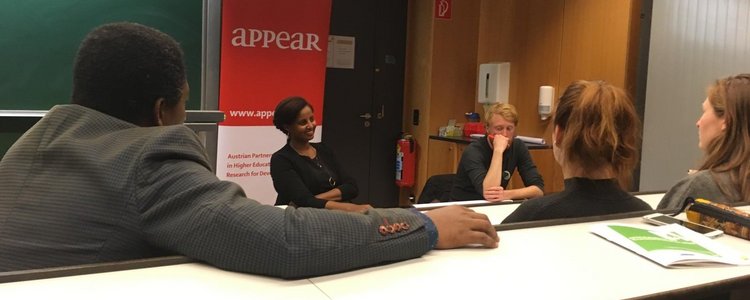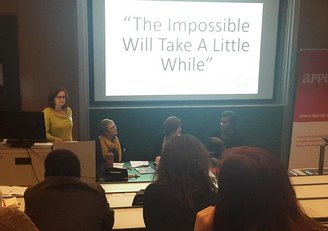Article 1 of the Human Rights Declaration begins with “All human beings are born free and equal in dignity and rights”. On the international level the human rights standards have been set down in different agreements. Providing access to justice for all and building effective, accountable and inclusive institutions at all levels for example has also been stipulated in the Sustainable Development Goals (SDG 16). Legal certainty, the guarantee of human rights and human rights education form an important basis for development and social change processes.
National governments have at least theoretically committed themselves to observing them. But what possibilities do we have if this does not happen? What importance does human rights education have for socio-ecological transformations? What are the underlying values and standards? Which knowledge and which skills are required to implement human rights in everyday life and to keep them on the political agenda?
The workshop started with an overview of the work of Amnesty International Austria with a specific focus on the role and means of human rights education. Subsequently, Bernadette Knauder and Elshaday Kifle Woldayesus, who are both members of the AAPLHRE project, presented the work of University of Graz and the range of human rights educational activities they are engaged in. They then elaborated on the work of the AAPLHRE project, the environment in which it is set and the educational activities it initiates and strengthens. AAPLHRE is a project between University of Graz, Addis Ababa University and the Ethiopian Civil Service University, which focuses on human rights education in the context of Ethiopia.
The second part of the workshop was interactive. A world café setting enabled participants to spend 15 minutes with each of the presenters. There was time to intensify discussions with reference to the presenters' inputs, but also to reflect on the question, what the challenges, solutions, and best practice examples in human rights education looked like, and to identify ways forward.
In a final plenum the presenters summarised the findings of their discussions with the participants:
- use a positive approach when talking to people about human rights;
- contribute to changing narratives and motivate people to change;
- be aware that there is fear of the unknown;
- be aware of the fact that each person carries their own "traumas" and experiences;
- support early awareness raising on human rights at schools;
- expect progressive realization of human rights rather than quick realisation;
- access to education and informal education is a prerequisite;
- freedom of expression is needed, use of story telling to transmit messages.
Elshaday Kifle Woldeyesus currently works at the Center for Human Rights at the Addis Ababa University and started as a PhD candidate at the University of Graz in October 2017. She was a researcher at the University for Peace – Africa Programme and at the Global Forum on Law, Justice and Development, World Bank. She holds a master’s degree from the United Nations mandated University for Peace in Costa Rica.
Bernadette Knauder works at the European Training and Research Centre for Human Rights and Democracy (UNI-ETC) at the University of Graz. She is a vital member of the AALPHRE project and engaged in various other research and educational projects. Bernadette has worked internationally as researcher and trainer at the nexus of human rights, peace, and development for Deutsche Gesellschaft für Internationale Zusammenarbeit (GIZ), the EU Fundamental Rights Agency (FRA), and the Austrian Study Centre for Peace and Conflict Resolution (ASPR). She holds Master's degrees in Political Science and Communication Science from the University of Vienna and a European Master's Degree in human rights and democratization from EIUC Venice.
Daniela Schier studied history at the University of Vienna and completed an Erasmus Mundus Master’s course in Global Studies (Vienna/Stellenbosch/Leipzig). Since 2012 she has worked at Amnesty International Austria. She is in charge of human rights education at schools. One point of focus is further education for teachers together with universities and university colleges of teacher education.
Chair: Julia Lichtkoppler (APPEAR Office)
Nachlese des Workshops auf der Website des Paulo Freire Zentrums

